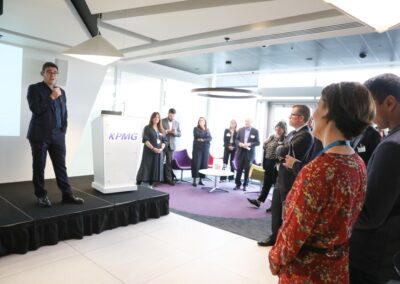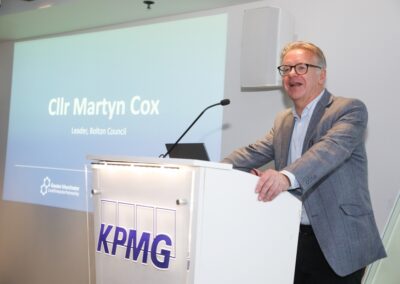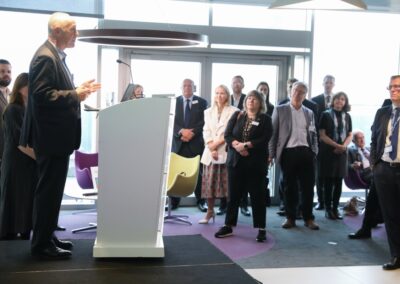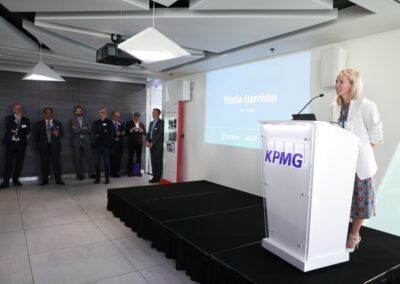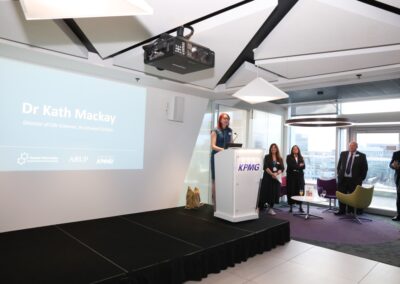Insights
Rochdale manufacturer’s net zero push to be highlighted at COP26
A Rochdale-based manufacturer whose efforts to cut carbon emissions have been supported by the Made Smarter programme will be showcased at the COP26 global climate summit.
Crystal Doors, which makes bespoke, vinyl wrapped doors and accessories for kitchens, bedrooms and bathrooms, will feature at the summit as one of nine outstanding sustainable organisations promoted by Nigel Topping, the UK Government’s High Level Champion for Climate Action.
The company has spent over £1.5m over the past five years on reducing carbon emissions and is set to achieve net zero by the time COP26 gets underway on October 31.
A series of sustainability investments – including energy saving lighting and equipment, solar panels and a world-first AI-powered dust extractor – saw the business awarded ‘Energy and Carbon Transition of the Year’ in 2020 by the Institute of Environmental Management and Assessment (IEMA). This was followed by a Queen’s Award for Enterprise for Sustainable Development in 2021.
Made Smarter’s digital transformation workshop process helped Crystal Doors to roadmap their journey to digital transformation of the business and identify opportunities to use technology to become more efficient. The fully-funded, bespoke process involved working with an impartial adviser to analyse the business’s products, services, processes and people, and develop a tailored digital transformation plan.
Through Made Smarter’s digital technology internship programme, which links students and postgraduates with SME manufacturers, Crystal Doors hired a three-month funded intern to implement a network of sensors that will provide insights into how machines are performing and identify potential efficiency improvements.
Richard Hagan, Managing Director of Crystal Doors, said:
“The climate summit in Glasgow will focus on technology, leadership and commitment. Our contribution is to show that every organisation of any size can achieve significant reductions in costs and the emission reductions required to slow climate change.
“The purpose of every business is to improve wellbeing and success for everyone. What we have achieved here in Rochdale is a new model of business values, similar to the Co-operative movement in the 1850s. We have a work culture that is constantly adapting, and each team member is regularly challenged with new technology to manage and skills to learn. All 31 employees are valued equally and together they celebrate our successes as a single community, with the average employee living within three miles of the factory.”
Through the Greater Manchester Economic Vision, the GM LEP is backing innovation in the advanced materials and manufacturing sectors to help companies transition to net zero. Former LEP member Juergen Maier chairs Made Smarter and current LEP member Justin Kelly chairs the Graphene, Advanced Materials & Manufacturing Alliance (GAMMA).
The GM LEP has also led the launch the Bee Net Zero programme, an initiative seeking to make Greater Manchester the easiest place in the UK to become a net zero business.
Gateway North Manufacturing Innovation Park
Manufacturing in Rochdale, Greater Manchester and the wider North is set to receive a further boost through the development of the Gateway North Manufacturing Innovation Park.
The site between Rochdale, Middleton and Bury, which lies about 5 miles from Crystal Doors’ headquarters, will host the North West’s newest and largest manufacturing innovation park.
Plans for the £650m development include 1.2 million sq m of commercial floorspace, with a cluster of new research and training facilities focusing on advanced materials, manufacturing, and modern construction methods, linked to the strengths of the universities in the city-region.
The nearby Kingsway site is planned to host a new Advanced Machinery and Productivity Institute (AMPI), an industry-led initiative involving the National Physical Laboratory to stimulate growth in manufacturing machinery and associated technology sectors.
Graphene, Advanced Materials & Manufacturing Alliance (GAMMA)
GAMMA is a partnership between the GM LEP, local public agencies, industry, universities and government responsible for coordinating the implementation of the local industrial strategy for this sector.
GAMMA was established to get a clear view of the needs of advanced materials and manufacturing businesses in Greater Manchester, be a focal point for government engagement, and to develop plans to ensure that effective support is delivered for the sector so that our private, public and academic assets are effectively utilised to deliver economic benefit.
The GAMMA vision is for advanced materials and industrial digital technologies that support the creation of a net zero advanced manufacturing supercluster in the North of England driving a more productive, sustainable, highly skilled, and innovative industry.
The programme offers additional targeted support through grant funding for the adoption of digital technologies, digital internships to help grow knowledge and capability in-house, and strengthening leadership through a structured programme bringing together business leaders.
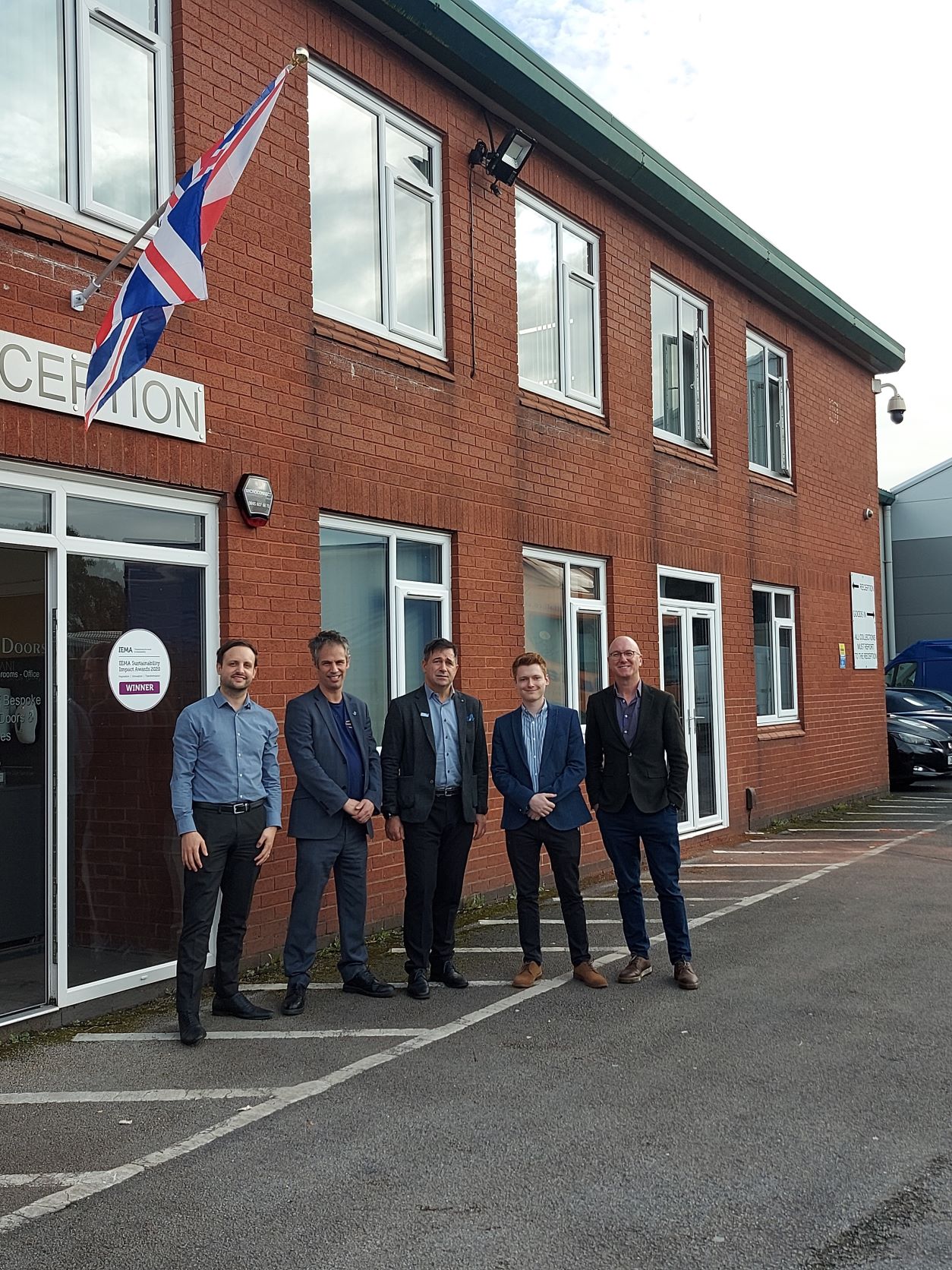
Low-emissions Concrete Underpins Greater Manchester’s Role in Green Industrial Revolution
-
Roller disco construction pilot just one example of net-zero innovation drive showcased by greenergreatermanchester.com campaign
-
Graphene-enhanced ‘Concretene’ can reduce concrete’s CO2 emissions by up to 30% – a major boost for sustainability of global construction sector
A roller disco building project trialling low-emissions concrete has underpinned Greater Manchester’s role in the Green Industrial Revolution, demonstrating how the city-region is leading efforts to decarbonise the global construction sector.
Concretene uses graphene – the revolutionary 2D material first isolated at the University Manchester – to significantly improve the mechanical performance of concrete, reducing the amount of material required and the need for steel reinforcement.
This can cut CO2 emissions by up to 30% and drive down costs, meaning Concretene is both greener and cheaper for developers.
Concretene is just one of example of the innovation underpinning Greater Manchester’s determination to be at the forefront of the Green Industrial Revolution, with a commitment to reaching net zero carbon neutrality by 2038.
Bold initiatives across smart energy, retrofitting, transport, natural environment, green finance, and green skills and jobs are being highlighted by a new website – www.greenergreatermanchester.com.
Concretene has been developed by the University of Manchester’s Graphene Engineering Innovation Centre (GEIC) and Nationwide Engineering, a company co-founded by a former University of Manchester civil engineering graduate, Alex McDermott.
It is being used to create a new 54×14-metre mezzanine floor, which will become a roller disco at Manchester’s Escape to Freight Island, at Mayfield Depot.
The installation is the first ever commercial use of Concretene in a suspended slab and marks a huge step towards testing and developing it as a widely used building material, allowing it to be used as a substitute for concrete on an industrial scale.
Nationwide Engineering Co-founder, Alex McDermott, said:
“Today is a huge milestone for the team, as not only is this our first commercial use of Concretene, but also the first suspended slab as used in high rise developments.
“As world leaders in Graphene Enhanced Concrete technology, the interest from the international building industry has been beyond expectations, as looming legislation is forcing significant carbon reductions throughout construction.”
“Our partnership with the University has fast-tracked the development of Concretene, going from lab to product in 18 months,” added Nationwide Engineering co-founder, Rob Hibberd.
James Baker, CEO of Graphene@Manchester at the University, said:
“We’re delighted to play a part in this exciting project at Mayfield, showcasing how our research can translate into real-world outcomes for sustainability that can be adopted by business and make a major contribution to the city region’s ambitions for net-zero by 2038.
“This Manchester-based technology can also contribute to levelling up by positioning our region as a global R&D centre for sustainable materials for the construction industry – attracting investment, creating new businesses and offering high-wage jobs.”
Justin Kelly, Greater Manchester Local Enterprise Partnership board member and member of the Graphene, Advanced Materials and Manufacturing Alliance, added:
“Concretene is a game-changer in the race to lower the construction industry’s carbon footprint and is a great example of how Greater Manchester’s leadership in advanced materials innovation could shape cities of the future. It also makes a major contribution to the city region’s ambitions to reach net-zero by 2038.”
The pour of the suspended slab at Mayfield marks a significant step towards testing and developing Concretene as a widely-used building material, allowing it to be used as a substitute for concrete on an industrial scale.
Concretene reduces the amount of concrete required in construction projects by as much as 30%. It also offers efficiency savings by slashing drying time from 28 days to just 12 hours.
Production of cement for concrete is one of the leading causes of global CO2 emissions, producing around 8% of total global emissions.
Amid ever-increasing global industrialisation, concrete is the most widely-used substance on Earth after water. For every tonne of cement, 1.25 tonnes of CO2 is produced. In context, global CO2 from cement production fills a space the size of London’s Millennium Dome every 23 seconds.
The use of graphene in concrete produces 6.3kg of CO2 per tonne of concrete – a 21.94kg reduction per tonne compared to traditional steel reinforcement. The total estimated reduction in CO2 emissions for this floor slab compared to a traditional concrete solution is 4,265kg.

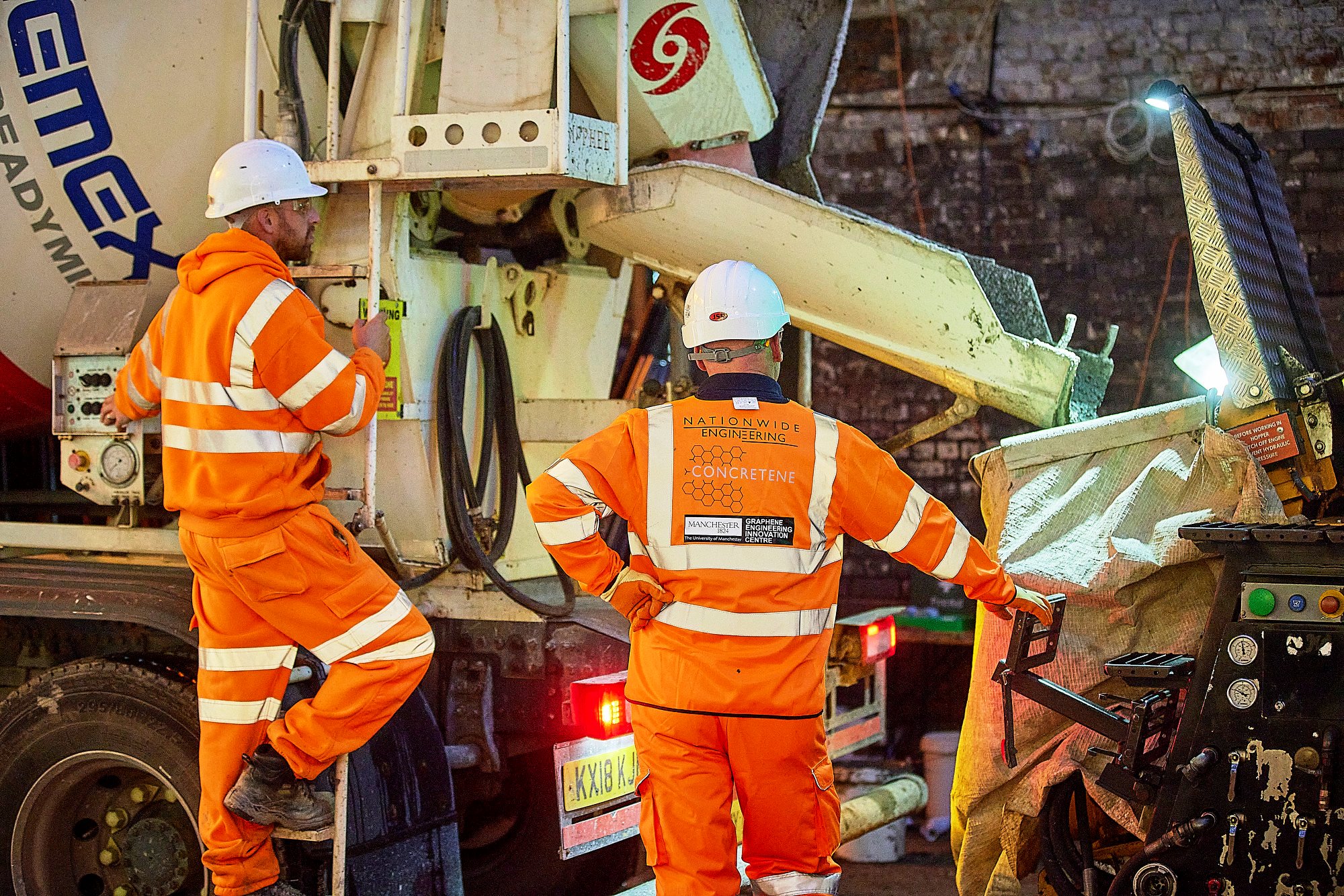
Conservative Party Conference Fringe: GM LEP Reception
A Greater Manchester Local Enterprise Partnership Reception provided an opportunity for attendees to learn more about Greater Manchester’s Levelling Up Deal with Government and the spirit of innovation and collaboration which supports the city-region’s Economic Vision.
Chaired by GM LEP chair Lou Cordwell OBE, the Conservative Party Conference fringe event heard from speakers representing business, the scientific and innovation community, and cross-party political leaders.
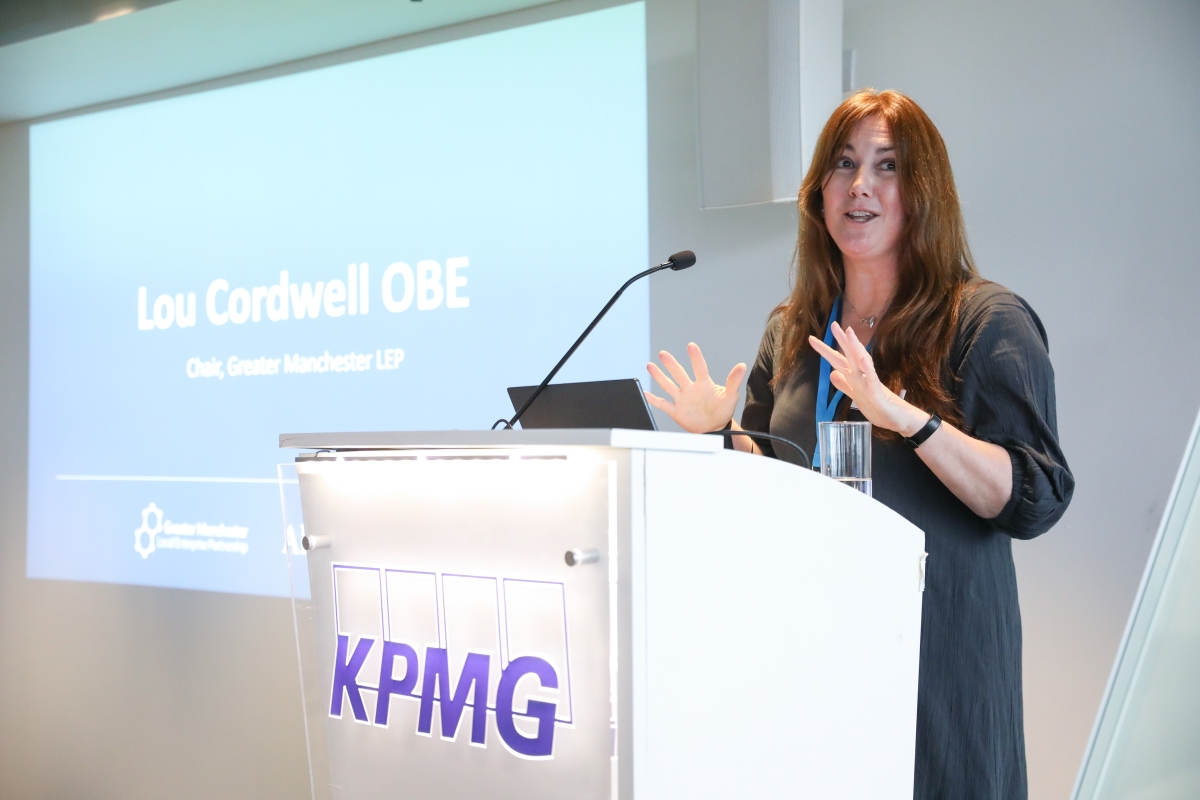
Lou Cordwell, Chair of GM LEP
Invited guests attending the reception included Conservative Party Conference delegates, GM LEP board members, local business, academic and scientific community members, Greater Manchester political leaders and journalists.
Greater Manchester mayor and GM LEP board member Andy Burnham spoke about the detail of Greater Manchester’s Levelling Up Deal with Government, including his vision for a London-style public transport system with London-level fares, supporting carbon net zero innovation and connecting residents across Greater Manchester to employment opportunities.
Greater Manchester’s Levelling Up Deal is a “positive offer to government… with cross-party support and the backing of the business community,” he said.
Cllr Martyn Cox, Conservative leader of Bolton Council, said he supported Greater Manchester’s Levelling Up Deal with Government because it would bring significant benefits for residents across the city-region, including Bolton.
He said:
“I support enterprise and I want to see growth, and a proper transport system will deliver growth. It’s important to the towns as well as the cities.”
Attendees were also addressed by Sir Richard Leese, GM LEP board member and outgoing leader of Manchester city council, who talked about some of the successes achieved in Manchester in recent years, and the importance of those successes being shared across the city-region.
Sir Richard said it was vital to invest in art, culture and the things that make the city-region “a place people want to be”, as well as local and regional transport links.
Representing business leaders, TalkTalk CEO Tristia Harrison spoke about Greater Manchester’s strengths as a platform for innovation and growth, particularly in the digital sector.
She explained how TalkTalk had started life as a start-up in Salford many years ago, evolving into a major tech company which recently closed its London headquarters in favour of returning to a base in the city. She said the relocation to Salford had been a tremendous success, with further investment in additional jobs to come.
“As long as we work together we can make GM and the North of England an extraordinary place,” she said. “We’re delighted to be here and will continue to invest.”
Dr Kath Mackay, director of Life Sciences at Bruntwood SciTech, detailed some of the successes that have been seen across Greater Manchester in recent years and the role for innovation in supporting levelling up.
Referencing Innovation Greater Manchester – a key pillar of Greater Manchester’s Levelling Up Deal with Government, she said:
“With the right investment, the region’s life science ecosystem could triple by 2040. Its beating heart is in GM.”
The GM LEP Reception was held in the St Peter’s Square offices of professional services network KPMG, who sponsored the event alongside the Manchester office of Arup.
Visit www.levellingupgm.com to find out more about Greater Manchester’s Levelling Up Deal with Government.
Rochdale and Wigan named among 54 ‘priority places’ by Arts Council England
Arts Council England has named the Greater Manchester boroughs of Rochdale and Wigan among 54 priority places across the country where it wants to develop new opportunities for investment, collaboration and progress.
Unveiling a three-year delivery plan to implement the vision of its Let’s Create strategy, the national development agency for arts and culture said it would now work with the priority places identified to develop new opportunities for investment, both from the Arts Council itself and other partners.
The publication of the Delivery Plan follows the Government’s £1.96 billion Culture Recovery Fund, administered by the Arts Council and other bodies.
Home to key cultural organisations such as Touchstones and M6 Theatre, and well-established venues including Middleton Arena, Rochdale is an area where there is significant potential for arts and culture to thrive.
Building on its heritage as the home of the very first modern co-operative movement, Rochdale has ambitious plans to work with partners, artists and local communities to increase access to culture through new co-operative leadership, delivery and co-production models and to grow cultural opportunities locally.
Since the beginning of the pandemic, Rochdale has received £1,137,509 investment from the Arts Council through the Government’s Culture Recovery Fund.

Councillor Neil Emmott, leader of Rochdale Borough Council said:
“This is more welcome news for the borough. We know how important creativity and culture are and I’m sure residents will appreciate this investment.
“There is hard work ahead, but with Arts Council support we are determined to do all we can to maximise the opportunity, bringing exciting events and projects across the borough and making our communities feel as engaged as possible.”
Wigan’s new Cultural Strategy, The Fire Within, demonstrates a significant ambition to maximise the benefits of culture and creativity to build upon the borough’s rich cultural history and sense of place.
Although currently an area of low cultural engagement and investment, it is home to the Turnpike Gallery, The Old Courts, Wigan Pier, the Royal Court Theatre and Haigh Hall.
It has the potential to continue the growth of the borough’s creative industries and increase opportunities for local communities to access a high-quality cultural offer.
Since the beginning of the pandemic Wigan has received £2,219,062 investment from the Arts Council through the Government’s Culture Recovery Fund.

Alison Mckenzie-Folan, Chief Executive of Wigan Council, said:
“This is a really exciting opportunity for Wigan and I am thrilled the Arts Council has identified our Borough as one to work closely with to increase cultural investment.
“We have already laid out ambitious goals for enhancing Wigan’s cultural offering through our Cultural Manifesto, The Fire Within, and a partnership with the Arts Council is really valuable in helping us reach those goals.
“Cultural experiences connect people, improve health and wellbeing and encourage visitors to come to our town centres and learn about our heritage. We hope to make Wigan one of the most exciting places in the country for the arts and culture sector.”
Find out more about the 54 priority places online at Arts Council England. Read more on the Delivery Plan in full online at Arts Council England.
Greater Manchester partners with global health company Novartis on pioneering cholesterol study
Community study builds on global sector strengths in health and social care innovation
The study is a collaboration between global health company Novartis, NHS England and Improvement, NorthWest EHealth, Health Innovation Manchester, and the National Institute for Health Research (NIHR) Applied Research Collaborative (ARC) Greater Manchester.
Greater Manchester-based organisations are collaborating as part of a new study involving 900 patients testing the implementation in primary care of inclisiran, a new drug to reduce LDL cholesterol. Up to 20 GP practices in Salford and Manchester will participate in the trial.
Building on the city-region’s frontier sector strength in health and social care innovation, Greater Manchester’s industry partnership with Novartis follows the signing of a first-of-its-kind ‘Memorandum of Understanding’ (MoU) between Health Innovation Manchester (HInM) and the pharmaceutical industry in 2017.
The MOU aimed to create an environment for collaboration between industry and healthcare in Greater Manchester to improve health, create a sustainable healthcare system, address challenges within the system and unlock the region’s economic potential.
High levels of LDL (low-density lipoproteins) cholesterol make people more likely to suffer a heart attack or stroke.
Inclisiran, a first-in-class small interfering RNA therapy, received a licence from the European Commission in December 2020 following the results of a robust clinical development program.
Inclisiran also gained NICE approval on 1 September 2021, recommending the drug for people with high cholesterol who have already had a previous cardiovascular event to reduce their LDL cholesterol, which is a key risk factor for them having another.
Trials showed that inclisiran lowers the level of the fatty and harmful substance called LDL cholesterol found in the blood by using RNA interference (RNAi) to boost the liver’s ability to remove it from the blood.
Inclisiran is part of the first NHS “population health agreement” between the NHS and Novartis to make the drug available to thousands of NHS patients and increase the treatment options available to patients to help control their cholesterol levels.
Chinmay Bhatt, Managing Director of Novartis UK, Ireland and Nordics and Country President UK, said:
“This is an exciting opportunity for us to invest in and partner with Greater Manchester. Greater Manchester is in a prime position to collaborate, co-develop and accelerate innovative solutions to solve some of the city region’s more complex and chronic health needs.
“The study forms part of our broader population health management collaboration with NHS England and will provide valuable insights into the successful primary care implementation of inclisiran.”
Dr Tracey Vell, Clinical Director of Health Innovation Manchester, said:
“Health Innovation Manchester and the Greater Manchester system are delighted to be partnering on this study which will allow us to identify at risk groups digitally, and then deliver innovative long acting cholesterol lowering therapy alongside other holistic care objectives.
“This is pioneering in many ways, including researching a population health approach for new pharmaceuticals, delivering them immediately in a primary care setting and looking at integrated delivery models with NHS England and Improvement and Novartis as partners. Through this we are hoping to deliver better outcomes for those at risk of cardiovascular disease as well as care close to their home and community.”
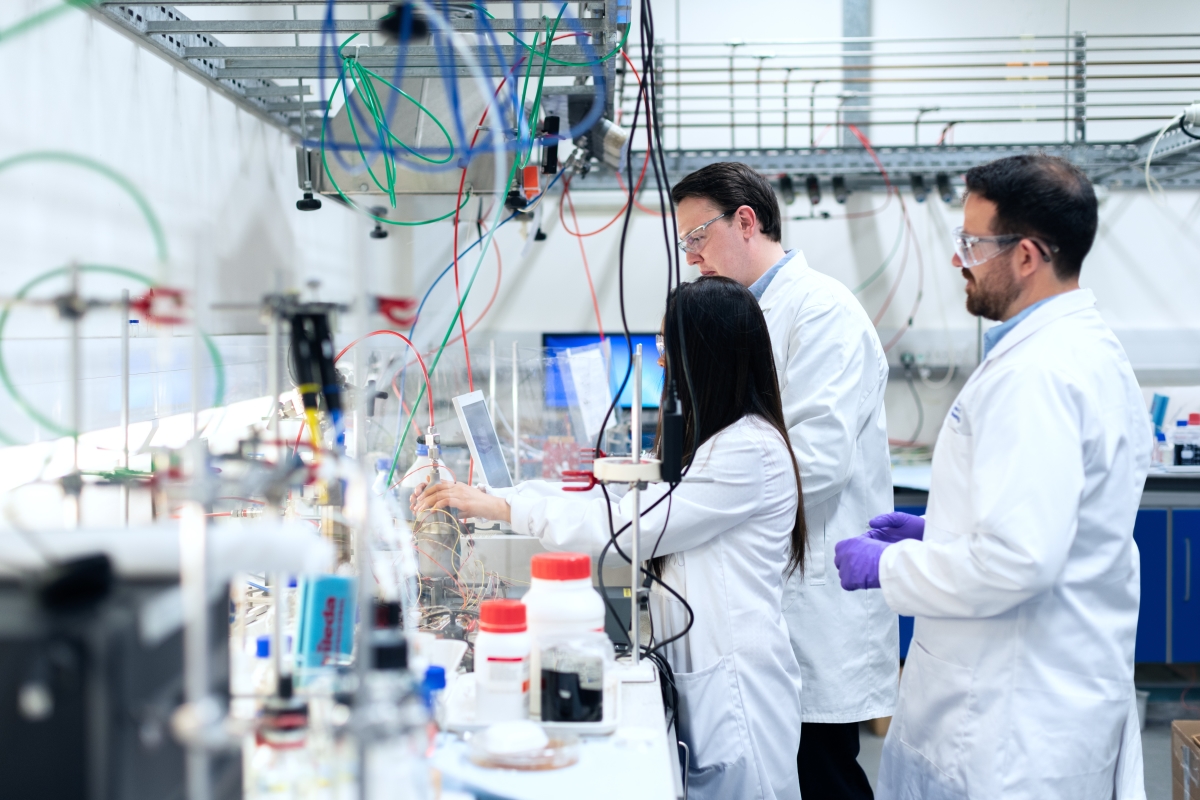
140 mature trees to provide green lung at Mayfield Park
Diverse species to transform an area previously inhospitable to trees in a former industrial area awarded Government funding directed by GM LEP
A collection of 140 mature trees of 43 different species have arrived in the UK ahead of being moved to their forever home at Manchester’s new Mayfield Park, the city centre’s first new park in 100 years.
The diverse species, including eye-catching, 12-metre tall Austrian Black Pines, will help to create a stunning, biodiverse natural landscape in an area of the city where few trees have ever been grown before.
As the epicentre of the textiles industry during the industrial revolution, the high levels of pollution from coal-burning cotton mills and workers’ homes at Mayfield meant the area was inhospitable to trees. Now, in a major step forward for green space in Manchester, Mayfield will be home to both UK native and non-native trees procured by the Mayfield Partnership from across Europe.
Mayfield Park was one of seven projects in Greater Manchester to receive a share of £54.2m from the UK Government’s Getting Building Fund.
Projects were chosen that would support the Greater Manchester Local Industrial Strategy agreed with Government by the Greater Manchester Combined Authority and GM LEP in 2019.
The Government pledged £23m of investment from its Getting Building Fund – one of the largest investments in any single project – to Mayfield Park.
The trees are currently being nurtured by local experts at Specimen Trees in Knutsford, Cheshire before being relocated to Mayfield in late autumn as part of a massive planting operation that will also introduce around 120,000 plants and bulbs of 250 different species to the Park.
When it opens to the public in autumn 2022, the Mayfield Park will feature open lawns, riverside walkways, three new bridges over the River Medlock, play areas and a variety of seating options, ensuring all members of the community have spaces they can visit and enjoy.
Arlene van Bosch, Mayfield Development Director at developer U+I, said:
“The arrival of the trees in the UK is such an exciting milestone for the creation of Mayfield Park. After many months of excavations, ground works and efforts to bring Mayfield’s hidden river back into view, we can’t wait to introduce these mature trees to their new home, alongside the thousands of wildflowers and plants that will bring the park to life as a vibrant, stimulating, sustainable and safe space for people to enjoy.
“We are thrilled to have been able to procure such an interesting and diverse collection of species to populate an area where few trees have ever grown before, turning what was once a hotbed of pollution into a ‘green lung’ for the city.”
Mayfield Park will be home to a variety of sizes of tree, ranging from three metres to upwards of 12 metres. Among the diverse collection of trees being brought to Manchester are the Quercus Rubra, or the Northern Red Oak, Slyphnolobium Japonicum, or Japanese pagoda tree and the Metasequoia Glyptostroboides, or the dawn redwood, which currently has endangered status.
Trees such as the Carpinus Betulus, or European Hornbeam, which are renowned for their climbing form, will be planted tactfully throughout the development to encourage people to engage with nature along the newly-uncovered River Medlock, which meanders through the heart of Mayfield.
The trees have been carefully selected by landscape architect Studio Egret West (SEW) working closely with Manchester City Council, the Environment Agency and the Greater Manchester Ecology Unit.
Tracey Rawlins, Executive Member for Environment for Manchester City Council, said:
“Mayfield Park will be a fantastic green addition to the city centre and help contribute to our policy of planting thousands of new trees across the city.
“As well as looking great, they help improve air quality, reduce flood risk and counter the effects of climate change by absorbing and storing carbon. Trees have an important role to play which is why we have launched the £1m Tree Action MCR planting programme.”
Duncan Paybody Associate Director & Landscape Architect at SEW, said:
“Trees are a crucial feature of the park design. We have chosen a variety of native and non-natives as we think it’s important that the first park of its kind in the city centre should provide a botanical collection to enlighten people’s knowledge and awareness of tree species.
“Climate resilience has also influenced our choices so species such as Catalpas and Gledistisas represent trees tolerant of slightly warmer climates.
“We have planned for time. Seasonal autumn leaf colour, spring and summer blossoms will signal different times of the year while long-lived species such as Metasequoia and red oaks will continue to grow and provide impressive scale for future generations.”
The new park is being created by the Mayfield Partnership, a public-private venture comprising regeneration specialist U+I, Manchester City Council, Transport for Greater Manchester and developer LCR.
Overall, the Mayfield regeneration scheme – one of the largest in the UK at 24-acres – is set to transform a gateway brownfield site next to the city’s mainline Piccadilly Station, into a stunning mixed used neighbourhood, delivering 1,500 homes, 1.6m sq ft of market-leading commercial space and 300,000 sq ft of retail and leisure facilities.
In 2020, the UK Government pledged £23m of investment from its Getting Building Fund – one of the largest investments in any single project – to Mayfield Park. This investment, delivered through the Greater Manchester Combined Authority, is part of the Government’s strategy to support ‘shovel ready’ schemes that will help to drive economic recovery following the COVID-19 crisis.
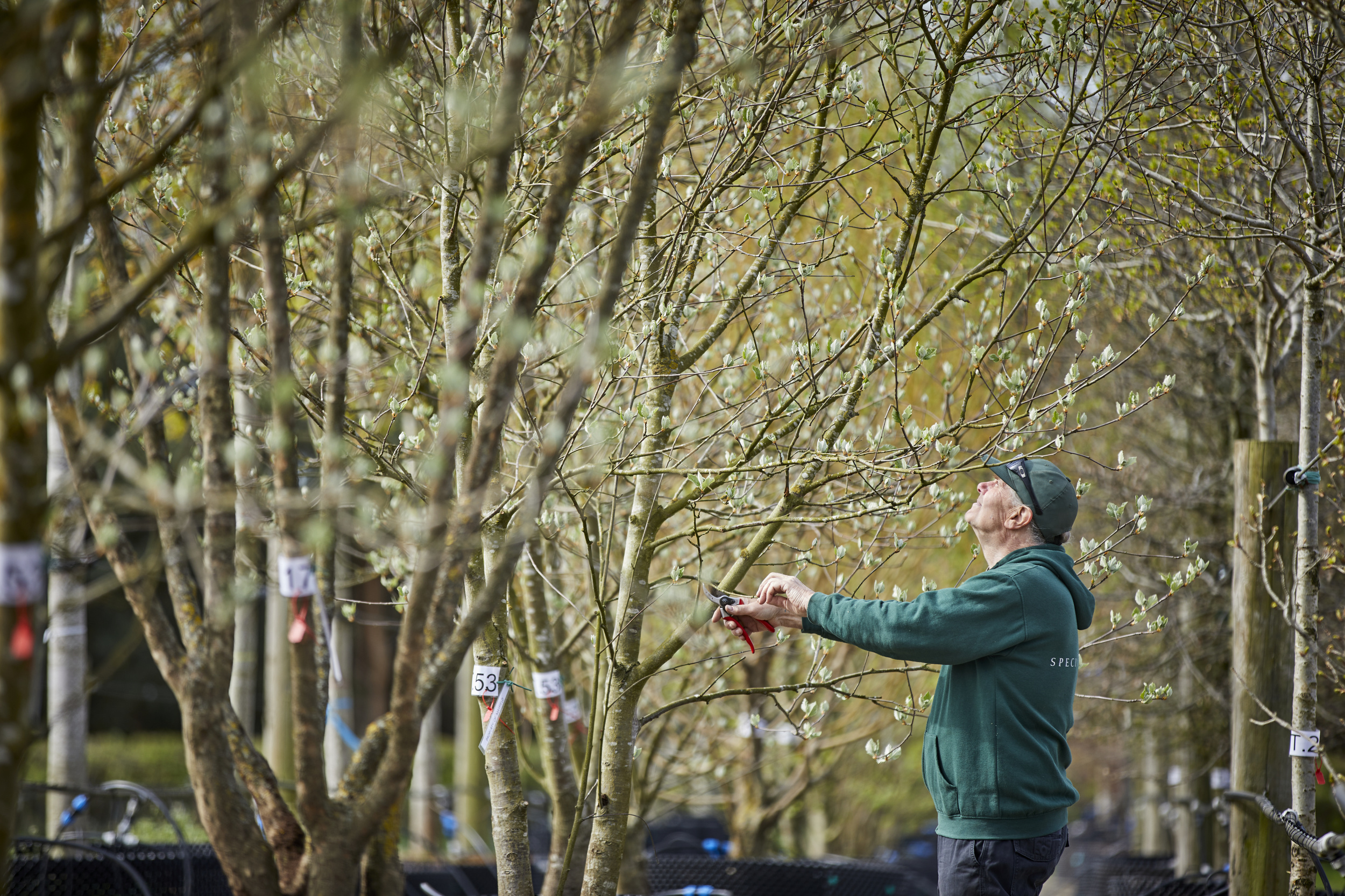
Specimen Trees of Knutsford are supplying mature trees for the Mayfield Garden, pictured Mike Evans from Specimen Trees

